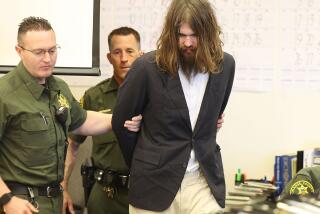Mother of teenager killed in hate crime more than a decade ago in Harbor Gateway has written a book about her daughter’s death
Saturday marked the 12th anniversary of the day when Charlene Lovett lost her teenage daughter to a hate crime that cast a spotlight on racial tensions in the Harbor Gateway area of Los Angeles.
Cheryl Green was just 14 when a Latino gang member, spurred by a long-standing rivalry between black and Latino gangs in the Harbor Gateway community, fired indiscriminately into the first group of black people he could find — a group of teenage girls and their friends, it turned out.
Green was shot in the abdomen and died. Some of her friends were wounded.
Lovett, who had moved into the neighborhood believing things had improved after years of violence, was devastated.
But she was not defeated, Lovett told friends and family gathered in Carson on Saturday to hear her talk about her new book, “Invisible Division: A Mother’s Story of Her Murdered Child,” which was published this month.
Young men came knocking on her door in the days after her daughter was killed, vowing revenge. But Lovett instead asked them to attend a prayer vigil.
When the killer, Jonathan Fajardo, was arrested weeks later and ordered to stand trial, Lovett said she had already forgiven him. Fajardo was convicted in 2010 of first-degree murder, with the jury finding that Green was the victim of a hate crime motivated by her race.
Lovett’s capacity for forgiveness and love in the face of unimaginable loss is grounded in her faith, she said.
“There was positiveness that came from it,” Lovett said. “I’m sharing pain and the hurt and how a community came together. How it brought politicians together. … It brought a lot of unity and change in this neighborhood.”
Though it was largely ignored by the media, Lovett’s Harbor Gateway neighborhood had been a source of Latino-on-black violence for years leading up to Green’s killing.
Unchecked urban development combined with enduring poverty and a lack of city services fueled tensions between newer and more established community members. A Latino gang looked to establish itself while a black gang nearby did the same. Neighborhoods soon became gang territories, and crossing the boundaries could have lethal consequences, even for the uninitiated.
But data showed the toll was greater for the black community in Harbor Gateway. From 1994 to 2005, there were nearly five times as many homicides, assaults and other violent crimes by Latinos against blacks as the reverse, according to Los Angeles Police Department statistics.
Where others may have placed blame on an entire people, Lovett sought compassion.
It’s an example that Kimberly Craft is trying to live up to.
Craft, 45, used to be Lovett’s neighbor. Though she didn’t live next to Lovett when Green was killed — she had moved to Atlanta with her kids to escape the violence — the two kept in touch.
In 2016, after Craft had moved back to Southern California, her son was killed in a traffic accident. He was in the back seat of a car in Michigan when a woman ran a stop sign and rear-ended the vehicle.
“I know this was an accident and I’m trying to live with that,” Craft said. “It was ‘What if this’ and ‘What if that’ and forgiving the woman who … did this. I was mad and wanting the worst ... And I’m thinking, ‘You know, this isn’t right. You just can’t live life like that.’ [Lovett’s] message was everything.”
Lovett began writing her book in 2010 but would stop sporadically for weeks or months, each time requiring a period to heal after reopening the wound of her daughter’s death.
She finished it in 2017. Just moments after leaving a meeting with her publisher this past October, Lovett received a phone call saying that Fajardo, who had been sentenced to death, had been fatally stabbed by a fellow death row inmate at San Quentin Prison.
She’d expected to endure so much more — a notice that Fajardo’s execution date had been set, then a long drive up to the Bay Area prison to witness it. Maybe even some resolution with Fajardo — if he’d ever reach out to her.
But instead, it was just the phone call.
“I just started crying, and I didn’t even know what I was crying for,” Lovett said. “It was like a final closure for me … of course, I think about my baby every day. She’d be 26, and I have grandkids and see her in them. It’s like I’m OK now. I’m done.”
joseph.serna@latimes.com
More to Read
Start your day right
Sign up for Essential California for news, features and recommendations from the L.A. Times and beyond in your inbox six days a week.
You may occasionally receive promotional content from the Los Angeles Times.







